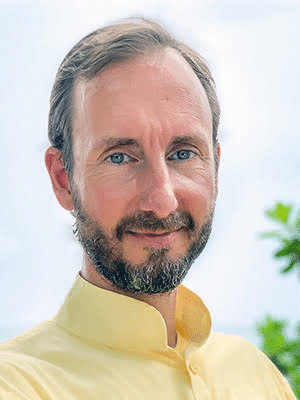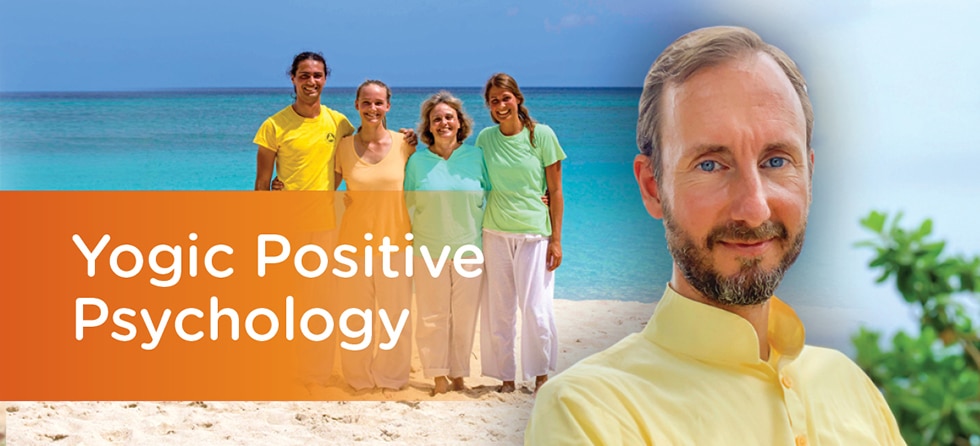- LIVE ONLINE PROGRAM
February 11- March 18, 2021
Yogic Positive Psychology: Understanding and Applying the Keys to Your Happiness
Pranava Chaitanya
6 WEEKLY SESSIONS, Thursdays 6:30-8:30pm EST
What you'll learn:
- Understand how we create our habits and our character
- Learn to focus in your life on habits that you want to change
- Make the necessary steps to change these habits
- Distinguish between positive and negative self-defeating thought patterns
- Know how various Yogic practices can uplift and change your energy
- Change the way you look at yourself and others by focusing on the strengths and weaknesses of yourself and others
- Understand the concept of the 3 Gunas or qualities that govern creation and how this understanding helps you to design a more fulfilled life
- Harness the power of the subconscious mind to transform yourself
- Work with personalized tools to improve your health and mental fitness
- Feel empowered to face life’s challenges with new vigor
- Understand your mind better
- Replace negative thoughts with positive ones
- Know how gratitude can help you become positive, happier and more successful
- Be able to implement even seemingly big changes in your life
- Apply tools that are scientifically proven to increase your positivity and happiness levels
- Know why and how gratitude can help you become happier and more successful
- Simply Be Happier
This 7-module program will teach you how to shape your life’s destiny in any way you like. Learn how to combine the ancient yogic teachings with the findings of modern positive psychology to create a powerful set of tools to transform your personal health, sense of well-being, and productivity to achieve happiness and success in every aspect of your life. At a subtle level, your thoughts are the building blocks of your health, relationships, and experiences in life. Positive thoughts are energizing and facilitate growth, while negative thoughts are draining. Get rid of old, self-defeating habits. Build new discipline and strength. Acquire a new set of tools, a rejuvenated mind and a fresh, confident outlook on life.
“Whether a person is aware of it or not, he is constantly transmitting and receiving thoughts. Thoughts control our lives, mold our characters, shape destiny, and affect other people. When the potential contained in the power of thought is realized it is the beginning of great spiritual growth in the individual” —Swami Vishnudevananda
Module 1: The Empowerment
From a Yogic perspective we are not the helpless victims of our destiny, but on the contrary the creators of our own destiny. The thoughts that we cultivate form not only our habits and character but also create our destiny.
Learning objectives:
Students will learn
- How the studies of modern Positive Psychology teach us that we are not helpless, and how we must actively live a happy, engaged, and meaningful life in order to experience “the good life.
- How by understanding the laws of thought, you can mold or shape your character in any way you like
- What negative self-defeating thought patterns are
- What positive empowering thought patterns are
- Key-findings of the scientific research on thought patterns
- How various Yogic practices can uplift and change your energy
Breakout: In a breakout session you will identify self-defeating thoughts that impede your wellbeing and personal growth and discuss with fellow participants how changing them will impact your life.
Personal Practice: Learn to pay attention to the changes of your breath throughout the day. Pay attention to your breath as a negative emotion arises. Learn to breathe deeply and consciously through that emotion. Continue to contemplate how you will change your life by changing your most self-impeding negative thought patterns.
Module 2: The Gunas
In the philosophy of Shankya Yoga, all matter in the universe arises from the fundamental substrate called Prakriti. From Prakriti the three qualities or Gunas arise, creating the essential aspects of nature.
The three Gunas are – Sattva – Rajas – Tamas
Learning objectives:
Students will learn
- To understand the concept of the 3 Gunas or qualities that govern creation
- How these Gunas manifest in our mind
- How this understanding helps you to design a more balanced and fulfilled life
- How the food that we eat has a big influence on our mind, well-being and happiness
- To apply the teaching of the Gunas to design a balanced diet
Personal Practice: Learn to focus on the nobility of people that surround you and thereby change the way you interact with them. Practice the 3 Gratitude’s: Write down three things that happened to you that you are grateful about today.
Module 3: Tapping into the Subconscious
The Yogic teachings and modern psychology tell us that about 90% of our mental activity happens in the subconscious mind, a process that we are not aware of.
Learning objectives:
Students will learn
- The structure of the mind
- Learn to change the programming of the subconscious mind with the method of Autosuggestion
- How to improve our overall wellbeing by practice of the General Formula
Personal Practice: Practice the repetition of the General Formula when you go to bed in the evening and before you get up in the morning.
Module 4: Working with the Subconscious Mind
Everything that we experience in life leaves an imprint, a subtle impression, in the subconscious mind. By consciously choosing what we “feed” our mind with, we can harness the power of the subconscious to cultivate specific tendencies within and thereby shape our reality in the desired way.
Learning objectives:
Students will learn
- How cognitive biases color the way we experience reality
- To harness the power of the subconscious mind to transform yourself
- To work with personalized formulas to improve your health and mental fitness
- How the practice of smiling can impact our day
Breakout: In a breakout session you will craft a personalized formula to improve your wellbeing and personal growth and discuss and fine-tune it through interaction with your fellow participants.
Personal Practice: Practice Journaling: Journal over one positive experience you had during the day. Continue to practice the repetition of the General Formula when you go to bed in the evening and before you get up in the morning. Using the knowledge gained in this module continue to create two personalized autosuggestive formulas of your choice closely related to your path of healing. Additionally, find the time to repeat the Particular Formula you created in class.
Module 5: The Mechanics of the Mind
Every thought, every experience leaves an imprint in the subconscious mind. Repeated impressions in the mind over time create personal tendencies and character traits and determine thereby how we manifest and experience life. Raja Yoga presents an excellent technique, known as Pratipaksha Bhavana, which helps you culture your mind in a systematic manner for promoting positive thinking.
Learning objectives:
Students will learn
- How repeated thoughts and desires create repeated experiences
- That this creates a vicious or divine circle
- How by this understanding we can use this mechanics for our own good
- The cultivation of opposing thoughts when assailed by destructive thoughts
- The three stages of Pratipaksha Bhavana
- How guided imagery works
Breakout: In a breakout session you will note down four negative or self-destructive thoughts and their opposing counterparts and discuss with your fellow participants how the repeated substitution of these thoughts will change your life.
Personal Practice: Practice a random act of kindness. Practice the method of Opposite Thoughts whenever a negative thought or emotion arises during your day and note down your experience. Continue to practice the repetition of the General Formula plus a Special Autosuggestion
Module 6: The PERMA Model
To enhance your own sense of authentic happiness and well-being the PERMA model presents a comprehensive view on what is important in our life. This model gives us a framework for understanding well-being as well as a foundation for improving well-being.
Learning objectives:
Students will learn
- The key-points of the model
- To identify strengths & weaknesses in our personal life
- How to optimize one’s life to find greater happiness and fulfillment in life
Breakout: In a breakout session you will identify exemplary strengths & weaknesses in your current life situation according to the model, identify potential improvements and discuss their implementation in your life with your fellow participants.
Personal Practice: Continue to reflect on the different key-areas in your life and refine improvement strategies. Start by implementing the change or improvement of one key area
Module 7: The Power of the Thought World
Swami Sivananda teaches that thought is a vital, living force. It is the most subtle and irresistible force that exists in the universe. It is a force like gravitation, cohesion, or repulsion. The yogis teach that the thought-world is relatively more real than this physical universe. Every thought that we send out into the universe, as it were, must have its opposing reaction and therefore consequence whether we like it or not.
Learning objectives:
Students will learn
- How our thoughts not only affect us but also others
- To become more aware of the consequences of our thoughts through the understanding of the law of Karma
- To be able to implement even seemingly big changes in your life
- Apply tools that are scientifically proven to increase your positivity and happiness levels
- Know why and how gratitude can help you become happier and more successful
Personal Practice: Practice Santosha or Contentment. Continue the practice of the previous days. Revisit these practices every few months. Smile! 😀
Technical Details
2-hour class sessions: 90 min of teaching. 15-minute practice and/or small group breakouts. 15-minutes of Q&A and discussion
Additional Information:
Offered as 6 weekly sessions on Thursdays, Feb 11, 18, 25, March 4, 11 & 18, 6:30-8:30pm EST
This program is offered live through Zoom webinar with the availability for students to interact through Q&A with the presenter.
For enrolled students, a video recording will be available after each class in the event you miss a class or would like to review the content.
It is possible to register and take the course at any time. You can catch up on any classes you miss with the recordings.
Requirements and Recommendations:
- No experience necessary. This program is open to beginners as well as advanced practitioners.
- Viewing Device: Desktop or laptop computer will provide the best experience, although you can also connect via a tablet or smartphone.
- Internet connection: High-speed broadband wired or wireless is best.
- Video: Download Zoom to your computer, or install the Zoom app to your device. For interactive group sessions, a webcam or integrated camera will allow others to feel more connected with you.
- Audio: Headphone speakers are recommended. If you wish to participate vocally, a headset with a microphone will be ideal.
Course Includes:
- 10.5 hours of on-demand video
- Bhagavad Gita – translation and commentary by Swami SivanandaΩ
- Course Manual

Pranava Chaitanya
Pranava Chaitanya is an advanced Sivananda Yoga teacher and senior staff at the ashram. He regularly teaches workshops, courses, and delivers satsang talks on a variety of topics including yogic practice, meditation, positive thinking, raja yoga, yogic diet, stress management, and yogic tools for happiness. He is one of the most popular and beloved teachers of our Sivananda Essentials Courses. He teaches with love, compassion, and care for his students, while delivering the materials in a very clear and coherent manner. Pranava Chaitanya is also a member of the Hatha Yoga team of our Yoga Teacher Training Courses (TTCs) at the ashram. He is the manager of the ashram kitchen and an expert on yogic and Ayurvedic nutrition and diet.
